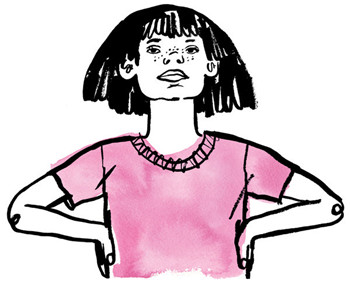(单词翻译:单击)

I WAS one of the first women in the San Francisco Fire Department. For more than a dozen years, I worked on a busy rig in a tough neighborhood where rundown houses caught fire easily and gangs fought with machetes and .22s. I’ve pulled a bloated body from the bay, performed CPR on a baby and crawled down countless smoky hallways.
我曾是旧金山消防局第一批女消防队员。十多年来,我带着整套装备,在环境恶劣的社区里工作。那里破旧失修的房屋极易失火,帮派拿着砍刀和.22口径的枪支火拼。我曾从海湾里拖出过泡胀的尸体,给孩子做心脏复苏,也曾在无数条烟雾弥漫的走廊里匍匐前行。
I expected people to question whether I had the physical ability to do the job (even though I was a 5-foot-10, 150-pound ex-college athlete). What I didn’t expect was the question I heard more than any other: “Aren’t you scared?”
我预料到人们会问,我是否有足够的体力做这份工作——即使我5英尺10英寸(约1.78米)高,体重150磅(约68公斤),曾是大学运动员。我没料到的是,我比其他任何人都容易遇到这个问题:“你不害怕吗?”
It was strange — and insulting — to have my courage doubted. I never heard my male colleagues asked this. Apparently, fear is expected of women.
质疑我的勇气不仅很奇怪,而且很羞辱人。我从来不曾听见我的男同事被问到这个问题。恐惧对于女性而言,显然是理所当然。
This fear conditioning begins early. Many studies have shown that physical activity — sports, hiking, playing outdoors — is tied to girls’ self-esteem. And yet girls are often warned away from doing anything that involves a hint of risk.
对于恐惧的这种条件反射在很早就开始了。许多研究已经表明,体力活动,包括运动、徒步远足和户外活动,都和女孩的自尊心紧密相连。然而,女孩常被告诫要远离任何有一丝危险的事情。
One study focused on, coincidentally, a playground fire pole, is particularly revealing. It was published in The Journal of Applied Developmental Psychology and showed that parents cautioned their daughters about the dangers of the fire pole significantly more than they did their sons and were much more likely to assist them. But both moms and dads directed their sons to face their fears, with instruction on how to complete the task on their own.
一项恰巧关注游乐场滑杆的研究,尤其发人深省。这篇发表在《应用发展心理学杂志》(The Journal of Applied Developmental Psychology)上的文章显示,比起对儿子,父母更加担心女儿玩滑杆会遇到危险,而且更倾向于帮助她们。但父母都要求儿子直面恐惧,指导他们如何靠自己完成这项挑战。
I spoke recently to a friend who admitted that she cautioned her daughter much more than her son. “But she’s very klutzy,” the mom explained. I wondered, wasn’t there a way even a klutzy child could take risks? My friend agreed there might be, but only halfheartedly, and I could see on her face that maternal instinct was sparring with feminism, and feminism was losing.
我最近和一位朋友交谈,她承认比起对儿子,她更担心她的女儿。“但她真的很笨手笨脚,”这位母亲辩解道。我很好奇,一个笨拙的孩子难道就没办法去经历风险?我的朋友同意或许有办法,但她立场并不坚定。从她的脸上,我可以感受到母性本能正在和女权主义搏斗,而女权主义失败了。
I had been a klutzy child, too. I was also shy, and scared of many things: big kids, whatever might be under my bed at night, school. But I pored over National Geographic and “Harriet the Spy.” I knew all about Sir Lancelot and the Knights of the Round Table, who wandered the countryside swearing oaths of bravery and honor. None of these characters talked about fear. They talked about courage, exploration and exciting deeds.
我也曾是个笨手笨脚的孩子。我也很害羞,惧怕很多事:比我大的孩子、在夜里也许藏在我床底的什么东西,还有学校。但我也全神贯注地读着《国家地理》(National Geographic)和《小间谍哈瑞特》(Harriet the Spy)。我熟知兰斯洛特爵士(Sir Lancelot)和圆桌骑士(Knights of the Round Table)的故事,他们游历四方,昭示着勇敢和荣誉。这些人物从未谈到恐惧。他们谈论的是勇气、探索和功绩。
So I biked down a steep country road (and hit a car). I sledded down an icy hill (and hit a tree). I don’t remember my parents freaking out; they seemed to understand that mishaps were part of childhood. I got a few stitches, and kept biking and sledding. Misadventures meant that I should try again. With each triumph over fear and physical adversity, I gained confidence.
我曾骑着自行车冲下乡间路的陡坡(撞上了一辆车);我也曾坐着雪橇滑下冰峰(撞上了一棵树)。我不记得我父母抓狂过,他们看上去很理解,小意外不断总是童年的一部分。我缝了几针后,依然会去骑自行车和滑雪橇。挫败意味着我应该再尝试一次。随着每一次克服恐惧,战胜挫折,我在胜利中获得了自信。
I recently asked my mother why she never tried to stop me. She said that her own mother had been very fearful, gasping at anything remotely rough-and-tumble. “I had been so discouraged from having adventures, and I wanted you to have a more exciting childhood,” she told me.
我最近问母亲,为什么她从来不试图阻止我。她说,她的妈妈曾经非常担惊受怕,任何一点小动静都会让她倒抽一口冷气。“我以前一直很害怕冒险,但我希望你拥有一个更精彩的童年,”她告诉我。
My mom is an outlier. According to a study in The Journal of Pediatric Psychology last year, parents are “four times more likely to tell girls than boys to be more careful” after mishaps that are not life-threatening but do entail a trip to the emergency room. It seems like a reasonable warning. But there is a drawback, and the researchers remarked on it: “Girls may be less likely than boys to try challenging physical activities, which are important for developing new skills.” This study points to an uncomfortable truth: We think our daughters are more fragile, both physically and emotionally, than our sons.
我的母亲是一个孤例。去年《儿科心理学杂志》(The Journal of Pediatric Psychology)发表的一项研究结果称,在发生不危及生命但的确需要赶到急诊室的意外事件之后,父母“告诫女儿要小心的可能性,比儿子高四倍”。这似乎是一个合理的警告。但也有一个不良后果,研究人员评价道:“女孩尝试具有挑战性的体育活动的可能性就降低了,而这对发展新技能是很重要的。”这项研究指出了一个令人不安的真相:我们认为女儿无论是生理上还是情感上,都比儿子更脆弱。
Nobody is saying that injuries are good, or that girls should be reckless. But risk taking is important. Gever Tulley, the author of “50 Dangerous Things (You Should Let Your Children Do),” encourages girls and boys to own pocketknives, light fires and throw spears, arguing that dangerous activities under supervision can teach kids responsibility, problem-solving and confidence. It follows that by cautioning girls away from these experiences, we are not protecting them. We are failing to prepare them for life.
并不是说受伤是好事,也不是说女孩应该莽撞,但经历风险是很重要的。《这50件危险的事应该让孩子去做》一书的作者吉佛·图利(Gever Tulley)鼓励让女孩和男孩拥有自己的折叠刀,点火、扔标枪,他认为在监督之下做危险的事情可以教会孩子负起责任、解决问题、拥有信心。如此推论,警告女孩不要体验这些事情,并不是在保护她们,而是未能让她们为生活做好准备。
When a girl learns that the chance of skinning her knee is an acceptable reason not to attempt the fire pole, she learns to avoid activities outside her comfort zone. Soon many situations are considered too scary, when in fact they are simply exhilarating and unknown. Fear becomes a go-to feminine trait, something girls are expected to feel and express at will. By the time a girl reaches her tweens no one bats an eye when she screams at the sight of an insect.
当一个女孩了解到“膝盖可能会破皮”是不去尝试滑杆的合理理由,她就会去学着躲避舒适区以外的事情。很快,有很多事情就会被认为过于可怕,尽管实际上那些事情只是让人兴奋、充满未知。恐惧成了女性的典型特征,人们预期女孩会感到恐惧,也会任意表达恐惧。快到青春期的时候,当一个女孩看到昆虫后惊呼,也不会有谁感到惊讶。
When girls become women, this fear manifests as deference and timid decision making. We try to counter this conditioning by urging ourselves to “lean in.” Books on female empowerment proliferate on our shelves. I admire what these writers are trying to do — but they come far too late.
当女孩变成女人后,这种恐惧就会体现为顺从和决策时的腼腆。我们通过督促自己“向前一步”来对抗这种境况。关于女性赋权的书摆满了书架。我很欣赏这些作者试图做的事情——但这都来得太晚了。
We must chuck the insidious language of fear (Be careful! That’s too scary!) and instead use the same terms we offer boys, of bravery and resilience. We need to embolden girls to master skills that at first appear difficult, even dangerous. And it’s not cute when a 10-year-old girl screeches, “I’m too scared.”
我们必须摒弃那种灌输恐惧的语言——小心点!太吓人了!——这在潜移默化间产生了负面的影响。应该讲与形容男孩子一样的,褒扬勇气和坚韧的话。我们需要鼓励女孩去掌握那些一开始看起来困难、甚至危险的技能。10岁的女孩尖厉地叫喊“我好害怕呀”,这并不是可爱。
When I worked as a firefighter, I was often scared. Of course I was. So were the men. But fear wasn’t a reason to quit. I put my fear where it belonged, behind my feelings of focus, confidence and courage. Then I headed, with my crew, into the burning building.
我在担任消防员期间,时常感到害怕。我当然害怕,那些男人也怕。但恐惧并不是退缩的理由。我把恐惧感放在了该放的地方,放在了我专注、自信、勇敢的情绪背后。之后我与战友并肩走进了燃起熊熊烈火的建筑物。


